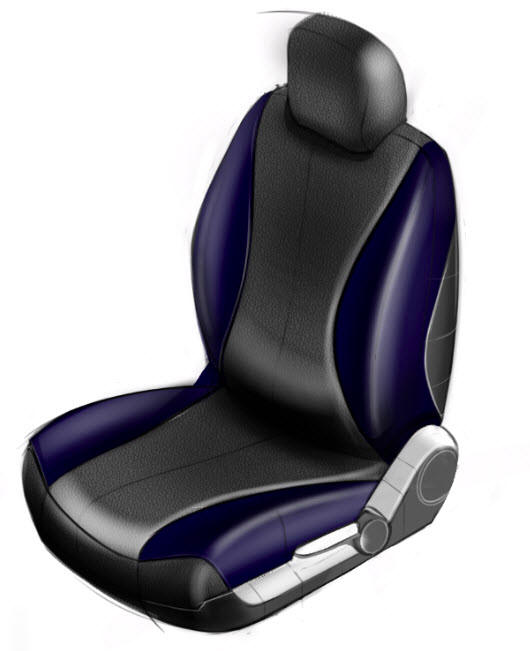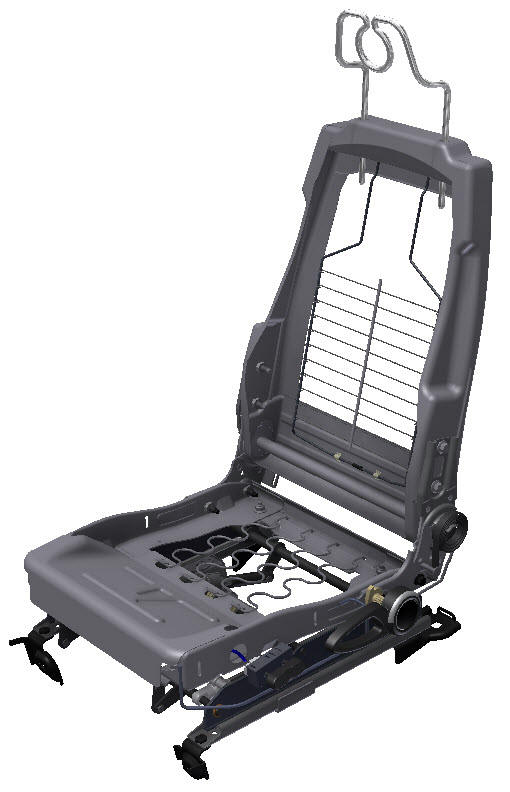|
Prerequisites |
Basic knowledge about solid mechanics, fluid dynamics, and heat transfer |
||||||||||||||||||
|
Overview
|
This course provides hands-on learning experiences on how modern CAD and CAE technologies improve the three key factors of product development: product quality, development cost, and time-to-market. The course will primarily cover first three-stages of the product development process: conceptual design (ideation), detailed design, and engineering analysis. In Fall 2013, we will use automotive seats as a target product.
The course starts with the initial ideation phase of development and concludes with producing technical publications of the product for marketing and support. Each segment of the course will contain lectures that illustrate the market demands and relationships of the product development cycle. Company case studies and demonstrations on how the modern CAD and CAE applications help companies develop better products will also be used during the lecture sessions. Throughout the semester the students will use modern digital engineering software packages to complete team projects and individual tasks. The primary projects for the course will be to redesign and make improvements to an existing automotive seat product for an upcoming new vehicle model.
The following commercial
software packages will be used as examples of modern digital prototyping
tools. The software packages will be made available to students with
no cost. |
||||||||||||||||||
|
Textbook |
There is no designated textbook for this course. Reading assignments will be posted in the schedule section of the class web. |
||||||||||||||||||
|
Assignments |
Problem Sets: 11 problem sets are given to help you better understand the course material and learn the software usage skills. Problem sets are posted on the "Schedule" section of the class web.
Projects: There will be two group projects: CAD Project and CAE Project Late Policy for Project Reports: No credit for late Project Reports.
Hand-in Directory:
Hand in your solutions to the problem sets by the beginning of the class on
the due date. For some problem sets your work should be uploaded to one of
the following AFS directories by the same due date and time: Grade Correction: Please review your graded paper right after it is returned to you to make sure that there is no error in grading. If you find a grading error, you need to let the instructor know as soon as possible but no later than a week from the date your paper is ready to be picked up. The grade will not be corrected after one week. Textbook Reading: Reading assignments are given occasionally . Check the schedule section regularly for each week's reading assignment.
In-Class Assignments:
During the lecture time, short (5-10min) in-class assignments will be given.
This allows you to reflect on what has been covered in the recent lectures
and reading assignments and to check your understanding of the material.
It also gives the instructor a chance to detect and point out typical
mistakes so you will be better prepared for quizzes. The
class participation credit (10% of the total grade) will be given partly
based on how many in-class assignments you submit. |
||||||||||||||||||
|
Policy on Missed Quizzes |
A missed quiz counts as zero credit unless you get permission in advance from the instructor. If you are sick a note from the student health center is required. A make-up quiz may not be of the same difficulty as the in-class quiz. The instructor can also give an oral make-up quiz instead. |
||||||||||||||||||
|
Estimated
|
Time management is a critical factor to your academic success, as to any professional environment. Being a 12-unit course, it is expected that each student will devote at least 12 hours a week to: (1) reading assignments, (2) lectures, (3) completing problem sets, (4) reviewing lecture materials, and (5) preparing for quizzes. |
||||||||||||||||||
|
Your final grade will be determined by an absolute method of grading. This is to allow you to obtain a grade based on your individual performance without having to compete with others. It is thus possible for the whole class to get an A grade or in the other case for the whole class to get a C grade. (Of course we hope that you all will work hard and get an A!) The final letter grade ranges are: A: 100-90% B: 90-80% C: 80-70% D: 70-60% The evaluation of your work in the course will be based on the following distribution:
|
|||||||||||||||||||
|
CAD Project |
In the first half of the semester, you will work with other students to design a new product.
9/19 (Thu) -- Project overview, Project team forming 10/8 (Tue) -- Project interim report due 10/17 (Thu) -- Project final report due 10/17 (Thu) -- Project presentation
|
||||||||||||||||||
|
CAE Project |
In the second half of the semester, you will work with other students to realize a multi-physics engineering analysis.
11/14 (Thu) -- Project overview, Project team forming 11/26 (Thu) -- Project interim report due 12/5 (Thu) -- Project final report due 12/5 (Thu) -- Project presentation
|

